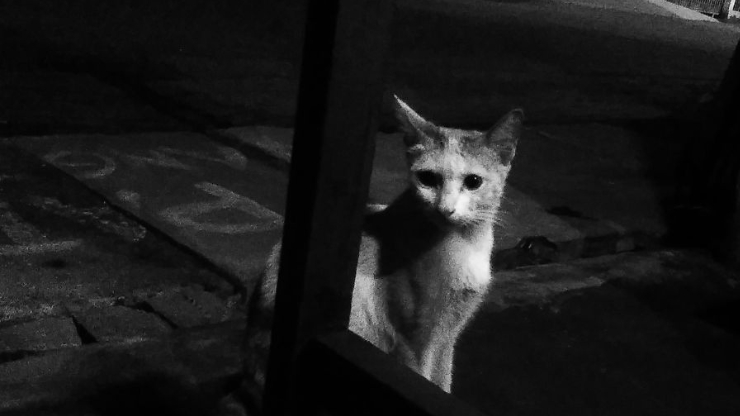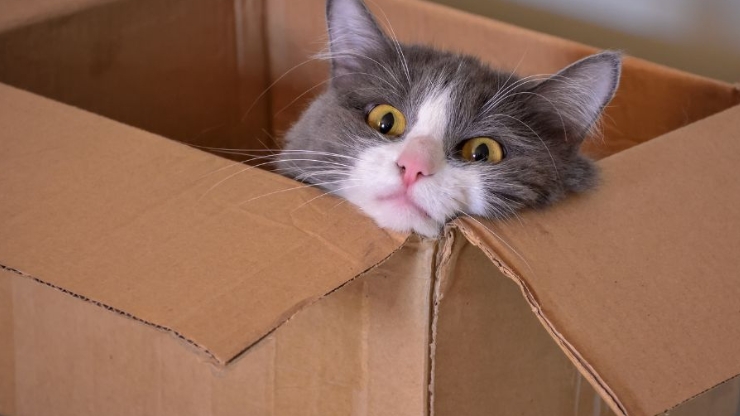When your cat awakes you at 4 AM or keeps bugging you through the night, causing you to lose untold hours of sleep, it’s easy to think that nothing can be done. After all, cats are nocturnal. We just have opposite schedules. This assumption is what causes people to put cats outside at night so they can hunt or do whatever cats do during peak hours. In truth, though, cats are not nocturnal. They are not hardwired to sleep all day and stay up all night.

Most sources on cat behavior indicate a good reason for us to believe that cats are nocturnal. These sources indicate that when most nocturnal animals are gearing up for the night, so are cats. And, when those same animals are winding down, cats are active. However, they are not active throughout the night.
Are Cats Nocturnal Or Crepuscular?
In other words, it is widely claimed that cats are crepuscular. They are most active, and prefer to hunt, during the twilight hours of dawn and dusk instead of full daylight or full darkness.
The word crepuscular comes from the Latin word creper, meaning dusky or gloomy. And, no, it is not related to the English verb creep, although cats do sometimes creep around looking for prey. The verb creep has an entirely different root.
While it is widely believed that cats are either nocturnal or crepuscular, the evidence for this is unconvincing. Even informal observation can easily demonstrate that not all domestic cats are crepuscular.
For example, rural farm cats seem more often to hunt and remain active during the daylight hours and sleep during the night. Urban cats are more likely to be active at dawn and dusk.
Domestic Cats May Be Becoming Diurnal, Like Us
This does not mean that we should accept without question that a lifelong indoor cat is crepuscular or otherwise, regardless of where we live. Some studies suggest that domestic cats are becoming more diurnal, meaning they are active during the daytime and sleep most of the night.
Cats Sleep More Than Us
Cats are often said to sleep 18 to even 23 hours a day! While a minority of cats will sleep 18 hours or more, most domestic cats sleep between 12 and 18 hours a day. Older cats usually sleep longer. It is extremely frustrating when a cat lays around cat-napping all day and then keeps you up all night. However, your own behavior and the environment and opportunities you give to your feline buddy will influence when and how much they sleep.
What To Do If Your Cat Keeps You Up At Night
If your cat is keeping you up at night, it is important to understand that you have a great deal of influence on your cat’s sleeping pattern, perhaps more so than his or her natural tendency, crepuscular or otherwise.
One of the best ways to get your cat to sleep when you sleep is to find ways to keep your cat active and interested during the day and to schedule play times during the evening hours as the sun is setting.
Schedule A Daily Play Session
One of the best times to have a good, vigorous play session with your cat is just before his evening meal. You may have noticed that your cat tends to have bursts of activity just before mealtime. This is called ‘food anticipatory activity‘ or FAA. Cats hunt and play harder when their stomachs are empty.
Because of this, a good play session before a meal can help your cat naturally wind down following his natural pattern: Hunt/play, eat, groom, then nap.
If your cat is a rescue cat, or once lived with another family, he or she may have developed habits based on this. For example, if your cat used to live outside, he may have developed the habit of staying up at night because he found more prey at night. This may be especially true in urban areas.
As well, kittens and younger cats will simply have more energy and will be more likely to display night-time activity. Make sure younger cats get plenty of activity during the day.
Provide Plenty of Enrichment
Besides play sessions, the best way to ensure cats stay more active is to provide plenty of enrichment in their environment. This can include:
- Lots of hiding areas (cardboard boxes with or without holes are great for games of hide and seek)
- Scratching posts or other scratching implements (consider a sisal rope post)
- A cat water fountain (this not only stimulates a cat to drink water but provides good fun)
- Plenty of safe cat toys
- High places for cats to jump, hang, or play (consider a cat tree with multiple levels)
Consider Medical Causes
One more reason that your cat may have a hard time relaxing and going to sleep at night is a medical cause. If your cat is feeling discomfort, for example, he or she may have a hard time staying asleep. If your cat has suddenly started bugging you during the night or staying up through the night, it’s best to see a vet to rule out medical issues.
When you visit your veterinarian, make sure you explain all your concerns, including your cat’s sleeping habits. Often, we tend to discount certain cat behaviors as normal or inevitable when, in fact, they are caused by medical issues. It is important to be vocal about your concerns for your cats.
Provide A Variety of Sleeping Places, Including High Ones
The final thing to consider is where your cat sleeps. Some cats, for instance, prefer to sleep up high where they feel safer and less exposed. A cat tree with sleeping areas at several levels can be a great choice for a cat that likes a higher sleeping area. As well, some cats like a variety of different sleeping areas and some will prefer an enclosed space, such as a nice, cushiony enclosed cat bed.
Key Summary Points
- Cats are not nocturnal by nature
- It is claimed that cats are crepuscular, active a dawn and dusk
- Domestic cats display variety of sleeping patterns, including diurnal, like humans
- Domestic cats may be becoming more diurnal than crepuscular
- Your behavior influences your cats sleeping schedule
- Encourage your cat to sleep at night by finding ways to keep your cat active and interested during the day
- Schedule a play session just before the evening meal
- Provide plenty of enrichment and opportunities for play and exploration
- Consider medical issues that may be keeping your cat up at night
- Provide a variety of comfortable sleeping choices and perhaps enclosed ones for cats that like to feel secluded and protected

